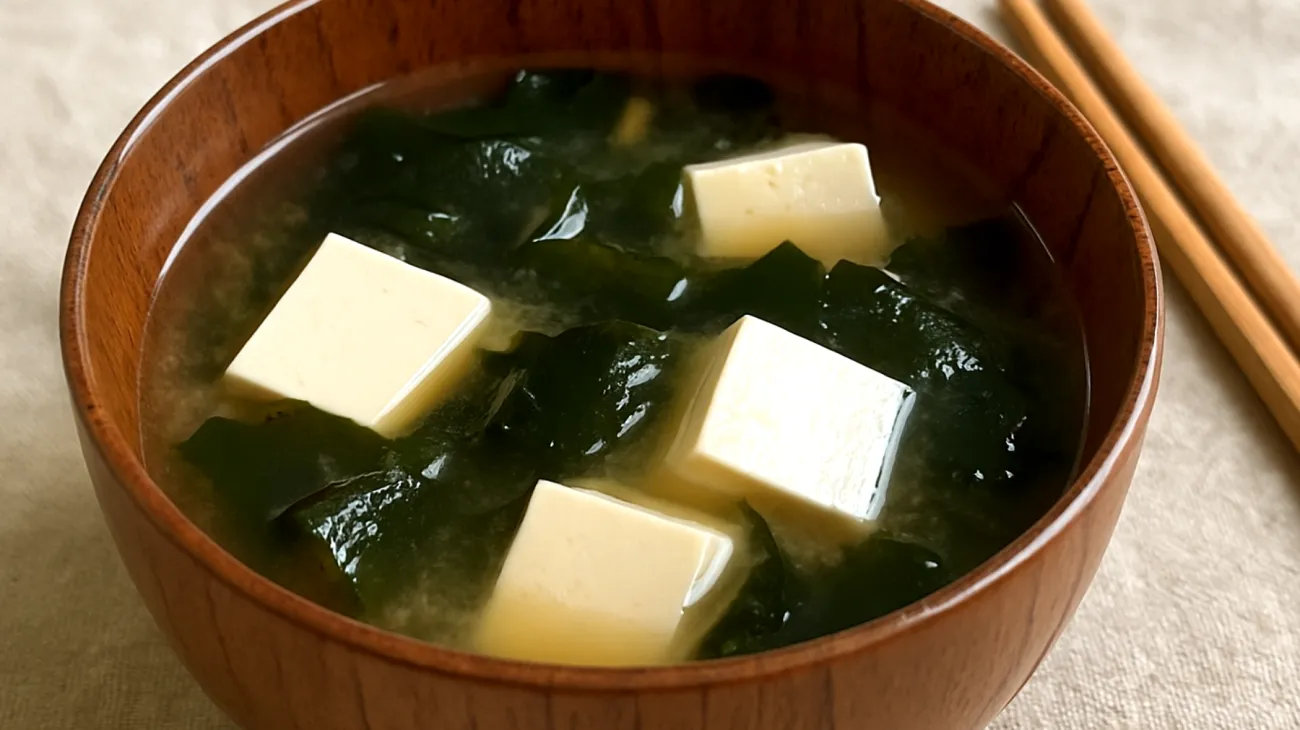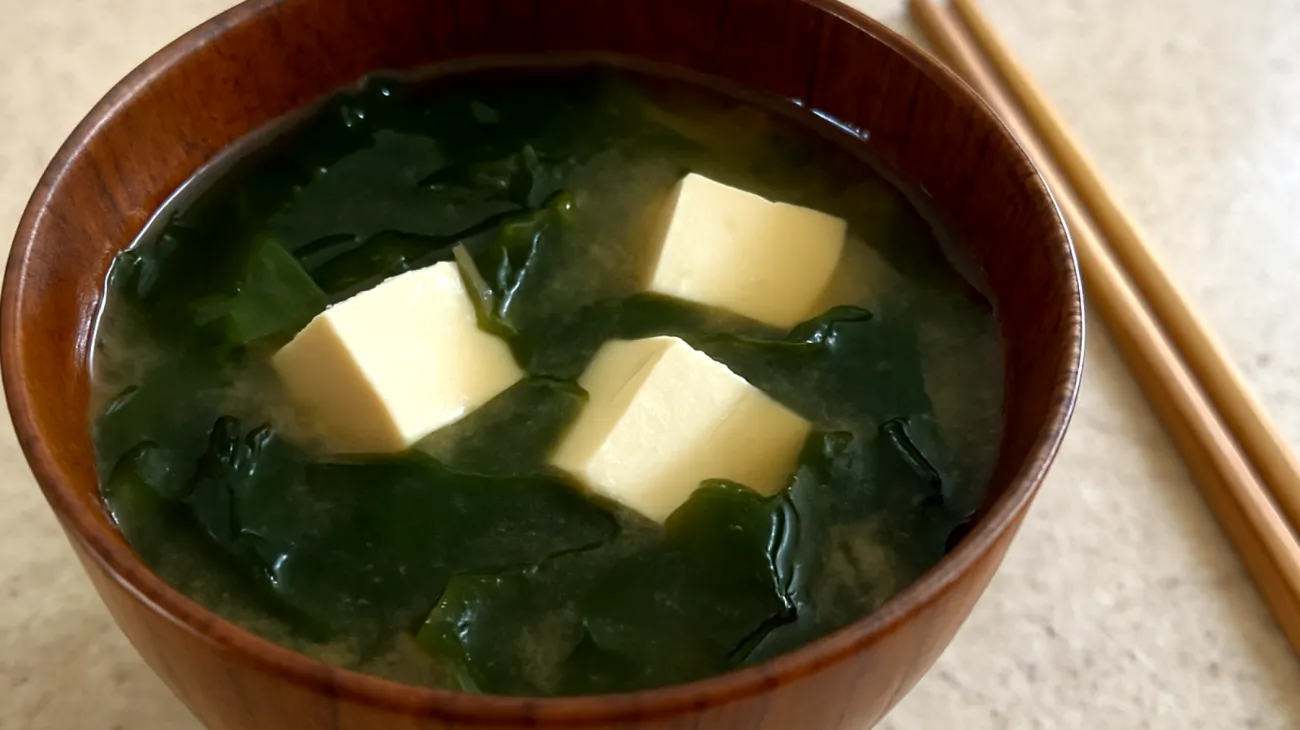When your morning energy reserves feel depleted and your body craves nourishment without heaviness, miso soup with wakame seaweed and silken tofu stands as a cornerstone of Japanese cuisine known for its exceptional nutritional balance. This traditional combination offers validated health benefits that speak directly to the needs of individuals navigating demanding, active lifestyles.
The Science Behind Sustained Energy
Unlike quick-fix energy solutions that leave you crashing within hours, miso soup delivers multiple nutritional benefits through its sophisticated nutrient profile. The fermented miso paste contains a rich B vitamin complex, including folate, niacin, and riboflavin, which play critical roles in energy metabolism and cellular function, directly supporting your body’s conversion of food into usable energy.
However, it’s important to dispel a common misconception: while some sources claim miso provides vitamin B12 naturally, research has shown that the B12 in miso is typically inactive and not bioavailable to humans. Those following plant-based diets should seek B12 from fortified foods or supplements rather than relying on miso for this essential nutrient.
The B vitamins that miso does provide work at the cellular level to help transform the food you consume throughout the day into sustainable fuel for both physical and mental performance, making this soup a strategic choice for sustained energy rather than empty calories.
Wakame: The Mineral Powerhouse You’ve Been Missing
Wakame seaweed is packed with nutrients and brings an impressive mineral profile that many active individuals unknowingly lack. The iodine content supports optimal thyroid function, which directly influences your metabolic rate and energy consistency throughout demanding days. This makes wakame particularly valuable for maintaining steady energy levels.
The magnesium present in wakame helps regulate muscle function and nervous system activity. For those experiencing morning fatigue despite adequate sleep, this mineral combination often addresses underlying deficiencies that conventional energy boosters simply cannot match. While wakame isn’t the highest dietary source of magnesium, it contributes beneficial amounts that support overall energy production.
Optimizing Your Iodine Intake
Regular inclusion of iodine-rich foods like wakame is essential for overall thyroid health. Despite claims circulating about optimal timing, scientific evidence shows that the benefits of iodine intake aren’t dependent on specific times of day. What matters most is consistent, adequate intake to support your thyroid’s continuous hormone production needs.
Silken Tofu: Complete Protein Without the Heaviness
The silken tofu component provides complete protein, containing all essential amino acids required for muscle maintenance and recovery. This makes it an excellent alternative to heavier protein sources, particularly valued for its lighter feel and easier digestibility compared to many animal proteins due to its lower fat content.

The protein in tofu helps stabilize blood sugar levels, preventing the energy rollercoaster that typically follows carbohydrate-heavy lunch options. For athletes and highly active individuals, this steady amino acid availability supports continuous muscle protein synthesis throughout training periods when consumed as part of a balanced diet.
Probiotic Power for Enhanced Absorption
The fermentation process that creates miso paste generates beneficial bacteria and enzymes that contribute to gut health and can aid nutrient absorption. These naturally occurring probiotics support digestive wellness, though their enhancement effect is primarily localized to the nutrients within the fermented food itself.
While some fermented foods may modestly improve the bioavailability of certain nutrients, the probiotic content in miso primarily supports overall gut health rather than dramatically increasing absorption of all foods consumed alongside it. This digestive support still makes miso soup a valuable addition to any meal plan focused on optimal nutrition.
Strategic Preparation for Maximum Benefits
The temperature at which you consume this soup significantly impacts its probiotic benefits. Warm consumption below 60°C (140°F) preserves the heat-sensitive beneficial bacteria in miso while promoting enzyme activity and digestive comfort. Boiling temperatures would destroy these valuable microorganisms, so careful temperature control during preparation is essential.
Quick Preparation Protocol
- Soak dried wakame in cool water for 5 minutes maximum to maintain texture and mineral content
- Heat water to just below boiling point before adding miso paste
- Add silken tofu cubes in the final 2 minutes to preserve protein structure
- Choose low-sodium miso varieties if you’re sensitive to salt or training in hot climates
Addressing Individual Considerations
While this nutritional combination benefits most active individuals, those with soy allergies should obviously avoid this option. Additionally, people with thyroid conditions should consult healthcare providers about appropriate iodine intake levels, as individual needs vary significantly based on specific thyroid disorders.
The soup’s low caloric density paired with high satiety makes it particularly suitable for those managing body composition while maintaining performance demands. The umami compounds naturally present create satisfaction levels that may help reduce afternoon overeating, supporting both energy stability and weight management goals.
For busy professionals and athletes alike, this 10-minute preparation time makes consistent nutrition achievable even during the most chaotic schedules. The combination of convenience, complete nutrition from tofu, beneficial minerals from wakame, and the probiotic content of miso positions this traditional soup as a practical tool for maintaining steady energy and supporting digestive health throughout demanding days.
Table of Contents

